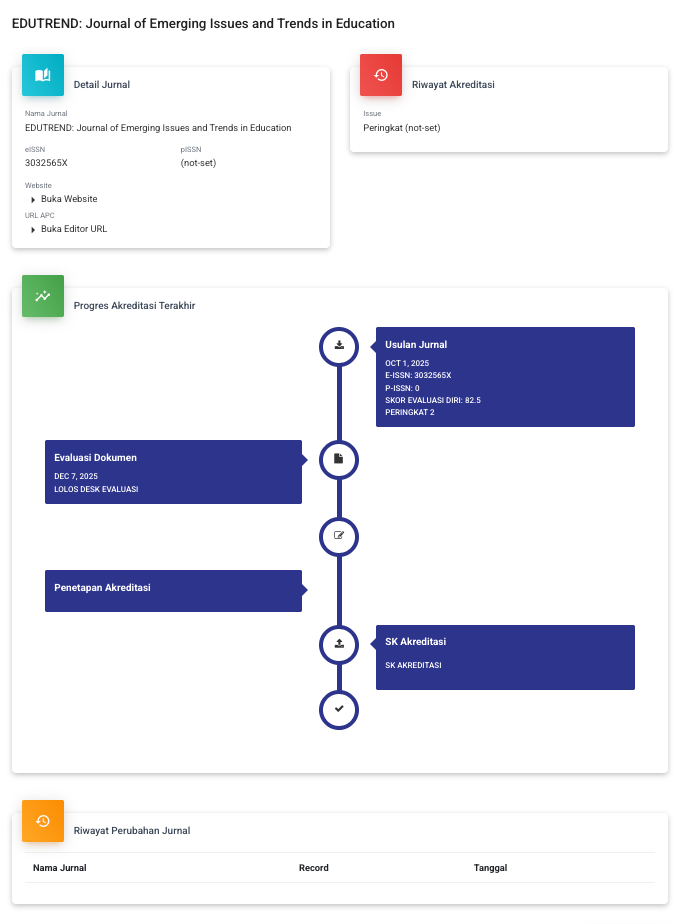The Role of Adversity Quotient in Academic and Social Adjustment: A Study on Non-Local Students in Makassar
DOI:
https://doi.org/10.59110/edutrend.513Keywords:
Adversity Quotient, College Adjustment, Non-Local StudentsAbstract
Non-local students often face significant challenges adjusting to their new academic and social environments. In college adjustment, it is necessary to have effort or fighting power (adversity quotient) to adapt to the place where they study. This quantitative study aims to examine the effect of the adversity quotient on college adjustment among non-local students in Makassar. The research participants consisted of 386 non-local students from outside South Sulawesi Province, currently in their first and second years of study in Makassar. The data collection instrument uses the College Self-Adjustment scale and the Adversity Quotient scale with a Likert scale model, both of which are modified scales. The data analysis technique used simple linear regression analysis with the help of SPSS software version 26. The results of this study prove that adversity quotient can have a significant influence on college adjustment (P=0.000; P<0.05). Subsequently, the percentage of adversity quotient contribution is 35.9% to college adjustment, while 64.1% is influenced by other variables that are not studied. Students who strive to adapt to the college environment will have good academic and non-academic performance and will survive in the following years. Conversely, students who make less effort to adapt to the college realm will have an impact on learning achievement results and feelings of dissatisfaction with their college experience.
References
Alfira, S. M. (2018). Adversity quotient dan penyesuaian diri sosial pada mahasiswa perantauan. Jurnal Prosiding Konferensi Mahasiswa Psikologi Indonesia, 31–39.
Baker, R. W., & Siryk, B. (1984). Measuring adjustment to college. Journal of Counseling Psychology, 31(2), 179–189. https://doi.org/10.1037/0022-0167.31.2.179
Baker, R. (2002). Research with the Student Adaptation to College Questionnaire (SACQ), Clark University. Posted by: Robert Shilkret Mount Holyoke College.
Chu, S., Chau, A., Chung, R., Chong, E., Ong, E., & Tam, A. (2019). A comparison of residence hall experience for students of different backgrounds. Journal of Student Affairs Research and Practice, 56(3), 326–339. https://doi.org/10.1080/19496591.2019.1582428
Dewanda, F. A. (2019). Hubungan antara adversity quotient dengan kecemasan dalam menghadapi dunia kerja pada mahasiswa tingkat akhir UIN Walisongo Semarang (Skripsi). Universitas Islam Negeri Walisongo.
Dostie, B & Jayaraman, R. The Effect of Adversity on Process Innovations and Managerial Incentives (June 2009). CESifo Working Paper Series No. 2684. http://dx.doi.org/10.2139/ssrn.1428740
Estiane, U. (2015). Pengaruh dukungan sosial sahabat terhadap penyesuaian sosial mahasiswa baru di lingkungan perguruan tinggi. Jurnal Psikologi Klinis dan Kesehatan Mental, 4(1), 29–40.
Fauzia, N., Asmaran, A., & Komalasari, S. (2021). Dinamika kemandirian mahasiswa perantauan. Jurnal Al-Husna, 1(3), 167–181. https://doi.org/10.18592/jah.v1i3.3918
Hapsari, Y., & Hamamah, H. (2019). International students in Indonesia: A study on academic and socio-cultural adjustment. Proceedings of the International Conference on Education and Learning (ICEL). https://doi.org/10.4108/eai.23-3-2019.2284956
Hartosujono, H. (2017). Perilaku adversity quotient mahasiswa ditinjau dari locus of control. Sosiohumaniora: Jurnal Ilmiah Ilmu Sosial dan Humaniora, 1(1). https://doi.org/10.30738/sosio.v1i1.519
Hidayati, K. B., & Farid, M. (2016). Konsep diri, adversity quotient dan penyesuaian diri pada remaja. PERSONA: Jurnal Psikologi Indonesia, 5(2), 137–144. http://jurnal.untagsby.ac.id/index.php/persona/article/view/730
Lestari, S. N., Meiyuntariningsih, T., & Ramadhan, H. S. (2023). Penyesuaian sosial pada mahasiswa rantau luar Jawa: Menguji peranan self-monitoring. INNER: Journal of Psychological Research, 2(4), 907–915.
Mutambara, J., & Bhebe, V. (2012). An analysis of the factors affecting students’ adjustment at a university in Zimbabwe. Journal of International Education Studies, 5(6), 244–250. https://files.eric.ed.gov/fulltext/EJ1067068.pdf
Nuralisa, A., & Astriana, S. (2016). Hubungan antara adversity quotient dan dukungan sosial teman sebaya dengan penyesuaian diri mahasiswa perantauan tahun pertama Fakultas Teknik Universitas Sebelas Maret Surakarta. Wacana, 8(2). https://doi.org/10.13057/wacana.v8i2.96
Oetomo, P. F., Yuwanto, L., & Rahaju, S. (2019). Faktor penentu penyesuaian diri pada mahasiswa baru emerging adulthood tahun pertama dan tahun kedua. Jurnal Ilmiah Psikologi MIND SET, 8(2), 67–77. https://doi.org/10.35814/mindset.v8i02.325gh
Pratiwi, A. J. (2017). Hubungan antara locus of control internal dan penyesuaian diri di perguruan tinggi pada mahasiswa tahun pertama (Skripsi). Universitas Sanata Dharma.
Putri, S. S. S., & Kusdiyati, S. (2024, February). Pengaruh Self-Esteem terhadap College Adjustment terhadap Mahasiswa Baru Pasca Pandemi Covid-19. In Bandung Conference Series: Psychology Science (Vol. 4, No. 1, pp. 508-514).
Saniskoro, B. S., & Akmal, S. Z. (2017). Peranan penyesuaian diri di perguruan tinggi terhadap stres akademik pada mahasiswa perantau di Jakarta. Jurnal Psikologi Ulayat, 4(1), 95–106. https://doi.org/10.24854/jpu67
Sari, N., & Rinaldi. (2018). Hubungan antara adversity quotient dengan penyesuaian diri mahasiswa luar daerah Sumatera Barat. Jurnal Psikologi Riset, 4. https://doi.org/10.24036/jrp.v2018i4.4369
Siregar, A. O., & Kustanti, E. R. (2018). Hubungan antara gegar budaya dengan penyesuaian diri pada mahasiswa bersuku Minang di Universitas Diponegoro. Jurnal Empati, 7(2), 48–65.
Stoltz, P. G. (1999). Adversity quotient: Turning obstacles into opportunities. John Wiley & Sons.
Tian, Y., & Fan, X. (2014). Adversity quotients, environmental variables, and career adaptability in student nurses. Journal of Vocational Behavior, 85(3), 251–257. https://doi.org/10.1016/j.jvb.2014.07.006
Downloads
Published
How to Cite
Issue
Section
License
Copyright (c) 2025 Fahranil Fathirah Asyah, Nurhikmah Nurhikmah, Tarmizi Thalib

This work is licensed under a Creative Commons Attribution-ShareAlike 4.0 International License.
















 the Creative Commons Attribution-ShareAlike 4.0 International License |
the Creative Commons Attribution-ShareAlike 4.0 International License | 